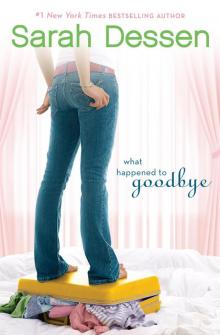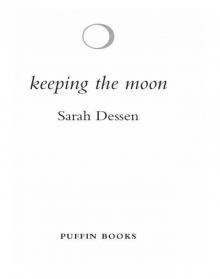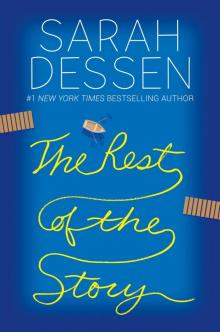- Home
- Sarah Dessen
This Lullaby Page 7
This Lullaby Read online
Page 7
“This is of the suck,” the guitar player said, pulling a pack of cigarettes from his pocket and shaking one out. “After this, no more weddings. I’m serious.”
“It’s money,” Ringo the drummer said, taking a sip of a bottled water he was holding.
“Not this one,” the keyboard guy muttered. “This is a gimme.”
“No,” Dexter said, running a hand through his hair. “This is the bail money. Or have we all forgotten that? We owed Don, remember?”
There was a grumbling acquiescence, followed by silence. “I hate doing covers,” the guitarist said finally. “I don’t see why we can’t do our own stuff.”
“For this crowd?” Dexter said. “Be serious. I don’t think Uncle Miltie from Saginaw wants to dance to your various versions of ‘The Potato Song.’”
“It’s not called that,” Ted snapped. “And you know it.”
“Settle,” the redheaded drummer said, waving his arm in a peacemaking gesture I recognized. “It’s only a couple more hours, okay? Let’s just make the best of it. At least we get to eat.”
“We get to eat?” the keyboardist said, perking up. “Seriously?”
“That’s what Don said,” the drummer replied. “If there’s enough left over. How much longer of a break do we have?”
Dexter glanced at his watch. “Ten minutes.”
The keyboardist looked at the drummer, then the guitarist. “I say food. Food?”
“Food,” they replied in unison. The keyboardist said, “You in, Dexter?”
“Nah. Just nab me some bread or something.”
“Okay, Gandhi,” Ringo said, and somebody snorted. “We’ll see you in there.”
The guitarist tossed down his cigarette, Ringo threw his water bottle toward the Dumpster—and missed—and then they went inside, the door slamming shut behind them.
I sat there, watching him, knowing for once he couldn’t see me first. He wasn’t smoking, instead just sitting there on the wall, drumming his fingers. I’d always been a sucker for dark-headed boys, and from a distance his suit didn’t look so tacky: he was almost cute. And tall. Tall was good.
I stood up and brushed my hands through my hair. Okay, so maybe he was really annoying. And I hated the way he’d bumped me against the wall. But I was here now, and it seemed only fitting that I take a few steps toward him, show myself, if only to throw him off a bit.
I was about to come around the Dumpster and into full sight when the door opened again and two girls—daughters of some cousin of Don’s—came out. They were younger than me, by a couple of years, and lived in Ohio.
“I told you he’d be out here!” one of them, the blond, said to the other. Then they both giggled. The taller one was hanging back, hand on the door, but her sister walked right up, plopping down beside Dexter. “We were looking for you.”
“Really,” Dexter said, and smiled politely. “Well, hello.”
“Hello yourself,” the blond said, and I made a face, in the dark. “You got a cigarette?”
Dexter patted his pockets. “Nope,” he said. “Don’t smoke.”
“No way!” the blond said, hitting him in the leg. “I thought all guys in bands smoked.” The taller girl, still by the door, glanced back behind her, her face nervous. “I smoke,” the blond said, “but my mother would kill me if she knew. Kill me.”
“Hmmm,” Dexter replied, as if this was actually interesting.
“Do you have a girlfriend?” the blond said abruptly.
“Meghan!” her sister hissed. “God!”
“I’m just asking,” Meghan said, sliding a little closer to Dexter. “It’s just a question.”
“Well,” Dexter said, “actually . . .”
And at that, I turned around and headed back the way I’d come, already pissed at myself. I’d come close to doing something really stupid—way lowering my standards, which judging by Jonathan were rock bottom already. This was the way the old me worked, living just for the next second, hour, wanting only to have a boy want me for a night, no more. I’d changed. I’d quit that, along with smoking—okay, with one lapse—and drinking—for the most part. But the sleeping around thing, that I’d held true to. Completely. And I’d been ready to throw it away, or at least bend it a bit, for a Frank Sinatra wanna-be who would have easily settled for Meghan from Ohio. God.
Back inside, the cake was out on the dance floor, with my mother and Don posing beside it, their hands intertwined over the cake knife as the photographer moved all around them, flash popping. I stood on the edge of the crowd, watching as Don fed my mother a piece, carefully easing it into her mouth. Another flash popped, capturing the moment. Ah, love.
The rest of the night went pretty much as I expected. My mother and Don left in a shower of birdseed and bubbles (with much of the hotel cleaning staff standing by looking hostile), Chloe ended up making out with Don’s nephew in the lobby, and Jess and I got stuck in the bathroom, holding Lissa’s head while she alternately puked up her fifteen-dollar-a-head dinner and moaned about Adam.
“Don’t you just love weddings?” Jess asked me, passing over another wad of wet paper towels, which I pressed against Lissa’s forehead as she stood up.
“I do,” Lissa wailed, missing the sarcasm. She patted the towels to her face. “I really, really, do.”
Jess rolled her eyes at me, but I just shook my head as I led Lissa out of the stall and to the sinks. She looked in the mirror at herself—smeared makeup, hair wild and curly, dress with a questionable brown stain on the sleeve—and sniffled. “This has to be the worst time of my life,” she moaned, blinking at herself.
“Now, now,” I told her, taking her hand, “you’ll feel better tomorrow.”
“No, you won’t,” Jess said, getting the door. “Tomorrow, you’ll have a wicked hangover and feel even worse.”
“Jess,” I said.
“But the next day,” she went on, patting Lissa’s shoulder, “the next day you’ll feel much better. You’ll see.”
So we were a bedraggled bunch as we made our way out into the lobby, with Lissa held up between us. It was one in the morning, my hair was flat, and my feet hurt. The end of a wedding reception is always so goddamn depressing, I thought to myself. And only the bride and groom are spared, jetting off into the sunset while the rest of us wake up the next morning to just another day.
“Where’s Chloe?” I asked Jess as we struggled through the revolving doors. Lissa was already falling asleep, even as her feet were moving.
“No idea. Last I saw her she was all over what’s-his-bucket back there by the piano.”
I glanced behind me into the lobby, but no Chloe. She always seemed to be elsewhere when anyone else was puking. It was like she had a sixth sense or something.
“She’s a big girl,” Jess told me. “She’ll be fine.”
We were hoisting Lissa into Jess’s front seat when there was a rattling noise, and the white van I now recognized as belonging to Dexter’s band pulled up in front of the hotel. The back doors popped open and out jumped Ringo, now without the clip-on tie, with the guitarist hopping out from the driver’s seat and following him. Then they disappeared inside, leaving the engine running.
“You need a ride?” Jess asked me.
“Nope. Chris is in there waiting for me.” I shut the door, closing Lissa in. “Thanks for this.”
“No problem.” She pulled her keys out of her pocket, jangling them. “It went okay, don’t you think?”
I shrugged. “It’s over,” I said. “That’s all that matters.”
As she drove off, beeping the horn once, I started back to the hotel to find my brother. When I passed the white van, Ringo and the keyboardist were coming back out, hauling equipment and bickering.
“Ted never helps,” the keyboardist said, hoisting some big speaker into the back of the van, where it landed with a crash. “This vanishing act is getting old, you know?”
“Let’s just get out of here,” Ringo replied. “Where’s Dexter?
”
“They get five minutes,” the keyboardist said. “Then they can walk.” Then he reached in the open driver’s-side window and planted his palm on the horn, letting it blare out, loud, for a good five seconds.
“Oh, good,” Ringo said sarcastically. “That’ll go over well.”
A few seconds later the guitarist—the elusive Ted—came out the revolving doors, looking irritated.
“Nice,” he yelled, coming around the van. “Real classy.”
“Get in or walk home,” the keyboardist snapped. “I mean it.”
Ted got in, the horn sounded one more time, and then they waited. No Dexter. Finally, after what seemed like a bit of bickering from the front seats, the van chugged away, taking a right onto the main road. The turn signal, of course, was busted.
Back in the hotel, the cleaning crew was at work on the reception hall, clearing glasses and pulling off tablecloths. My mother’s bouquet—eighty bucks of flowers—sat abandoned on a tray table, still as fresh as when she’d first picked it up at the church over nine hours earlier.
“They left you,” I heard someone say. I turned around. Dexter. God help me. He was sitting at a table next to the ice sculpture—two swans intertwined and quickly melting—a plate in front of him.
“Who did?” I asked.
“Chris and Jennifer Anne,” he replied, as if he’d known them forever. Then he picked up a fork, taking a bite of whatever he was having. It looked like wedding cake, from where I was.
“What?” I said. “They left?”
“They were tired.” He chewed for a second, then swallowed. “Jennifer Anne said she had to go because she had an early seminar tomorrow at the convention center. Something about achievement. She’s very bright, that girl. She thinks I might have a future in the corporate and private leisure activity sector. Whatever that means.”
I just looked at him.
“Anyway,” he went on, “I said it was fine, because when you showed up we’d just give you a ride.”
“We,” I repeated.
“Me and the guys.”
I considered this. And I’d been so close to being scot-free, home by now care of Jess. Great. “They’re gone too,” I said finally.
He looked up, his fork midway to his mouth. “They what?”
“They left,” I repeated slowly. “They beeped the horn first.”
“Oh, man, I thought I heard the horn,” he said, shaking his head. “Typical.”
I looked around the mostly empty room, as if a solution to this and all my other problems might be lurking behind, say, a potted plant. No luck. So I did what seemed, by now, inevitable. I walked over to the table where he was sitting, pulled out a chair, and sat down.
“Ah,” he said, with a smile. “Finally, she comes around.”
“Don’t get too excited,” I said, dropping my bag onto the table. I felt tired in every part of my body, as if I’d been stretched thin. “I’m just getting the energy up to call a cab.”
“You should try some of this cake first.” He pushed the plate at me. “Here.”
“I don’t want any cake.”
“It’s really good. It doesn’t taste chalky at all.”
“I’m sure it doesn’t,” I said, “but I’m fine.”
“You probably didn’t even get any, right?” He wiggled the fork at me. “Just try it.”
“No,” I said flatly.
“Come on.”
“No.”
“Mmmm.” He poked at it with the fork, gently. “So tasty.”
“You,” I said finally, “are really pissing me off.”
He shrugged, as if he’d heard this before, then pulled the plate back toward himself, dipping the fork in for another bite. The cleaning crew was chattering away in the front of the room, stacking chairs. One woman with her hair in a long braid picked up my mother’s bouquet, cradling it in her arms.
“Da-da-da-dum,” she said, and laughed when one of her coworkers yelled at her to stop dreaming and get back to work.
Dexter put down the fork, the tasty, non-chalklike cake gone, and pushed the plate away. “So,” he said, looking at me, “this your mom’s first remarriage?”
“Fourth,” I said. “She’s made a career of it.”
“Got you beat,” he told me. “My mom’s on her fifth.”
I had to admit, I was impressed. So far I’d never met anyone with more ex-steps than me. “Really.”
He nodded. “But you know,” he said sarcastically, “I really think this one’s going to last.”
“Hope springs eternal.”
He sighed. “Especially in my mom’s house.”
“Dexter, honey,” someone called out from behind me, “did you get enough to eat?”
He sat up, then raised his voice and said, “Yes, ma’am, I sure did. Thank you.”
“There’s a bit more of this chicken dish left.”
“No, Linda. I’m full. Really.”
“Okay then.”
I looked at him. “Do you know everybody?”
He shrugged. “Not everybody,” he said. “I just bond easily. It’s part of the whole repeating-stepfather thing. It makes you more mellow.”
“Yeah, right,” I said.
“Because you have to just go with the flow. Your life is not your own, with people coming in and out all the time. You get mellow because you have to. I mean, you know exactly what I’m saying, I bet.”
“Oh yes,” I said flatly, “I am just so easygoing. That is precisely the word that describes me.”
“Isn’t it?”
“No,” I told him. “It isn’t.” And then I stood up and got my bag, feeling my feet ache as they settled into my shoes. “I have to go home now.”
He got to his feet, taking his jacket off the back of the chair. “Share a cab?”
“I don’t think so.”
“All right,” he said, shrugging. “Suit yourself.”
I walked to the door, thinking he’d be behind me, but when I glanced back he was across the room, going out the other way. I had to admit I was surprised, after such intense pursuit, that he had given up already. The drummer had been right, I supposed. The conquest—getting me alone—was all that mattered, and once he saw me up close I wasn’t so special after all. But I, of course, knew that already.
There was a cab parked out front, the driver dozing. I climbed into the backseat, sliding off my shoes. It was, by the green numbers on the dashboard, exactly 2 A.M. At the Thunderbird Hotel across town, my mother was most likely fast asleep, dreaming of the next week she’d spend in St. Bart’s. She’d come home to finish her novel, to move her new husband into the house, to take another stab at being a Mrs. Somebody, sure that this time, indeed, it would be different.
As the cab turned onto the main road, I saw a glint of something through the park, over to my right. It was Dexter, on foot, turning into a neighborhood, and in his white shirt he stood out, almost as if he were glowing. He was walking down the middle of the street, the houses dark on either side of him, quiet in sleep. And watching him head home, for a second it was like he was the only one awake or even alive in all the world right then, except for me.
Chapter Five
“Remy, really. He’s just wonderful.”
“Lola, please.”“I know what you’re thinking. I do. But this is different. I wouldn’t do you like that. Don’t you trust me?”
I put down the stack of checks I’d been counting and looked up at her. She was leaning on her elbow, chin cupped in her hand. One of her earrings, a huge gold hoop, was swinging back and forth, catching the sunlight streaming through the front window.
“I don’t do blind dates,” I told her, again.
“It isn’t blind, honey, I know him,” she explained, as if this made some kind of difference. “A nice boy. He’s got great hands too.”
“What?” I said.
She held up her hands—impeccably manicured, naturally—as if I needed a visual aid for this basic part of human a
natomy. “Hands. I noticed it the other day, when he came to pick his mother up from her sea salt scrub. Beautiful hands. He’s bilingual.”
I blinked, trying to process the connection between these two characteristics. Nope. Nothing.
“Lola?” a voice called out tentatively from inside the salon, “my scalp is burning?”
“That’s just the dye working, sugar,” Lola called back, not even turning her head. “Anyway, Remy, I really talked you up. And since his mother is coming back this afternoon for her pedicure—”
“No,” I said flatly. “Forget it.”
“But he’s perfect!”
“Nobody,” I told her, going back to the checks, “is perfect.”
“Lola?” Now the voice sounded more nervous, less polite. “It’s really hurting. . . .”
“You want to find love, Remy?”
“No.”
“I don’t understand you, girl! You’re about to make a big mistake.” Lola always got loud when she felt passionate about something: now, her voice was booming around the small waiting room, rattling the sample nail polishes on the shelf above my head. A few more active vowels and I’d be concussed, and as quick to sue as the woman whose hair was burning off, ignored, in the next room.
“Lola!” The woman, now shrieking, sounded like she was on the verge of tears. “I think I smell burning hair—”
“Oh, for God’s sake!” Lola bellowed, angry at both of us, and whirled around, stomping out of the room. As a purple nail polish crashed onto my desk, missing me by inches, I sighed, flipping open the calendar. It was Monday. My mother and Don would be back from St. Bart’s in three days. I turned another page, running my finger down past the days, to count again how many weeks I had before I left for school.
Stanford. Three thousand miles away from here, almost a direct shot across the country. An incredible school, my top choice, and I’d been accepted by five out of the six others I’d chosen to apply to. All my hard work, AP classes, honors seminars. Finally it meant something.
Freshman year, when such decisions are made, my teachers had me pegged for the state party school, if I was lucky—someplace where I could do an easy major, like psych, with a minor in frat parties and makeup. As if just because I was, okay, blond and somewhat attractive with an active social life (and, okay, not the best of reputations) and didn’t do the student council/debate team/cheerleader thing, I was destined for the sub-par. Grouped with the burnouts and the barely graduating, where just making it down from the parking lot after lunch was far exceeding expectations.

 Just Listen
Just Listen Along for the Ride
Along for the Ride This Lullaby
This Lullaby Once and for All
Once and for All Lock and Key
Lock and Key The Truth About Forever
The Truth About Forever Someone Like You
Someone Like You What Happened to Goodbye
What Happened to Goodbye Dreamland
Dreamland Keeping the Moon
Keeping the Moon The Rest of the Story
The Rest of the Story The Moon and More
The Moon and More What Happens to Goodbye
What Happens to Goodbye